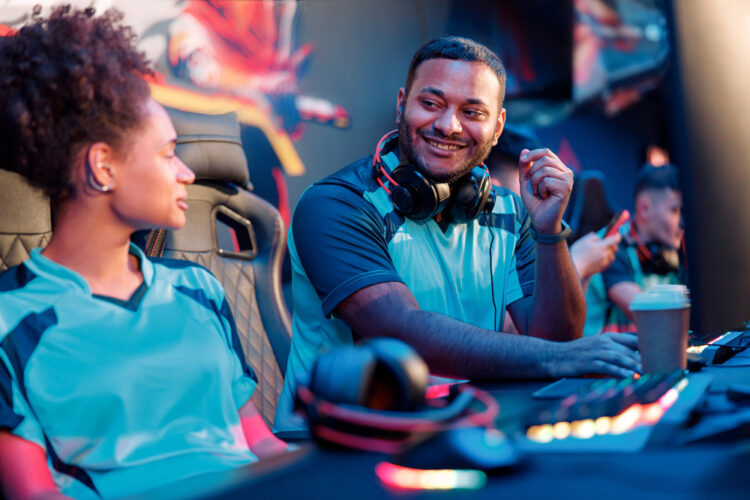When delving into the realm of esports, it is essential to discern the distinctions between casual and competitive play beyond surface-level understanding. These disparities encompass intricate nuances that significantly influence one’s gaming experience and performance. Whether you are a seasoned professional or a novice player, recognizing these differences is crucial for refining your skills and gaining a competitive advantage in esports.
Prior to engaging in your next gaming session, it is prudent to contemplate how these variations may impact your strategic approach and contribute to enhancing your overall gameplay proficiency.
Gaming Experience Variances
In esports, the distinction between casual and competitive play lies in the variance of gaming experiences. Casual play typically emphasizes enjoyment, experimentation with diverse strategies, and a relaxed approach to the game, free from the pressures of intense competition. Players often partake in friendly matches, testing out new characters or tactics, and engaging in social interactions with friends.
In contrast, competitive play entails a more serious and focused mindset. Players strive for victory, meticulously plan strategies, and dedicate themselves to refining their skills to excel at the highest levels of competition. The competitive gaming experience is characterized by heightened concentration, commitment, and a strong desire to enhance performance and achieve success in the esports arena.
Don’t forget to check out our article Understanding the Risks Associated With High-Stakes Esports Bets.
Skill and Strategy Requirements
Competitive esports demand a higher level of skill and strategic thinking compared to casual play. Players need exceptional mechanical abilities like precise aiming, quick reflexes, and efficient movement. Understanding game mechanics, map awareness, objective control, and team coordination are essential for success in competitive gaming.
The capacity to adapt swiftly, predict opponents’ actions, and execute complex strategies is pivotal in competitive environments. Unlike casual play focused on enjoyment, competitive gaming requires dedication to improvement, extensive practice, and a strong desire to win.
Mastering advanced techniques, analyzing gameplay data, and studying professional strategies are key aspects for aspiring competitive esports players.
Player Mindset and Approach
Maintaining a focused and competitive mindset is essential for success in esports. When engaging in competitive play, it’s important to approach it with a positive attitude and a willingness to learn and adapt. Unlike casual play, which prioritizes enjoyment and relaxation, competitive play demands a higher level of concentration and commitment.
Developing a strategic mindset, analyzing opponents’ strategies, and consistently honing your skills are crucial aspects of a competitive player’s approach. Viewing challenges and setbacks as opportunities for improvement can aid in progress within the competitive scene.
It’s crucial to strike a balance between competitiveness and good sportsmanship to foster a healthy gaming environment. By cultivating resilience and adaptability, players can enhance their performance and excel in the competitive esports landscape.
Community and Social Dynamics
Engaging with the esports community facilitates connections among players who share a common interest in competitive gaming. The community and social dynamics within esports significantly impact the overall experience for both casual and competitive players. It serves as a platform for players to interact, exchange strategies, and enhance their gameplay through shared learning.
In casual play, the community often revolves around enjoyment, meme-sharing, and a relaxed gaming atmosphere. Conversely, competitive players utilize the community to form teams, strategize, and participate in competitive events. The social dynamics within the esports community contribute to a sense of inclusion and camaraderie, fostering a supportive environment that enables players to develop and enhance their gaming skills.
Training and Improvement Techniques
Developing your skills in esports necessitates structured training and specific methodologies to enhance your gameplay. Here are effective approaches to elevate your performance:
- Regular Practice: Consistent training is fundamental for refining your reflexes and decision-making abilities.
- Gameplay Analysis: Assessing your matches enables you to pinpoint errors and areas needing improvement.
- Feedback Acquisition: Seeking advice from seasoned players can furnish valuable insights for progress.
- Goal Setting: Establishing clear objectives aids in focusing your efforts, whether aiming to master a new tactic or achieve a specific ranking.
- Mental Acuity: Maintaining proper rest, nutrition, and mental well-being is crucial for sustaining optimal performance.
Also, check out our article about total kills and first blood bets in esports here: https://casinosobserver.com/2024/12/17/exploring-total-kills-and-first-blood-bets-in-esports/
Conclusion
Understanding the differences between casual and competitive play in esports is crucial for enhancing your gaming experience. By acknowledging the varying skill levels and strategic demands, adjusting your mindset and approach accordingly, and being aware of the community dynamics, you can navigate these distinct environments effectively. Whether your goal is to enjoy experimentation or achieve top rankings, adapting to these differences is essential for success in the realm of esports. Engage in gameplay with this knowledge in mind, and appreciate the journey ahead.

